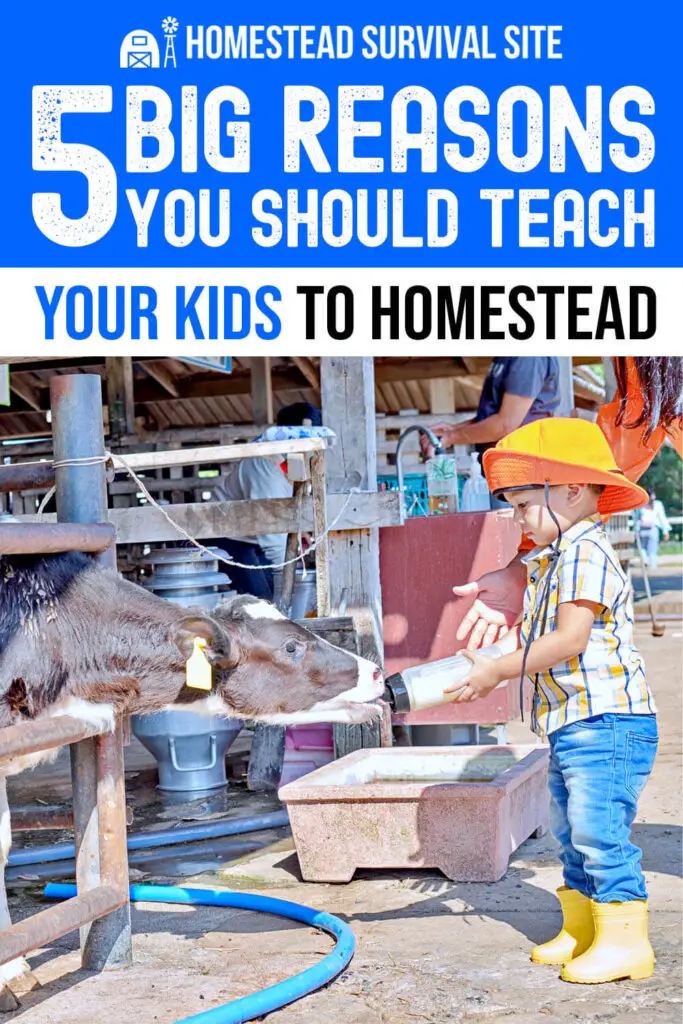Estimated reading time: 5 minutes
Raising kids in a homesteading environment is one of the best ways to give them a great start in life. The skills and values they learn can help them be successful at whatever they choose to do later in life. Whether they take over the farm and follow in your footsteps or decide to travel a different path, life skills taught on the homestead will take them far.
Here are five reasons why…
Want to save this post for later? Click Here to Pin It On Pinterest!
1. Connections
Connections don't always have to be of the social kind. When growing up on a homestead, children learn to connect in other ways and with more than just people. One of these bonds is with the animals they may have access to.
This can include pets, livestock, and even wild animals. When dealing with living, breathing creatures, a child will become familiar with the circle of life – and death.
Forming a relationship with the environment is another benefit of life on the farm. Kids learn to be observant and relate to the world around them. Teach them to pay attention to things like the weather, water, and wildlife in the area.
It will help them understand how each of these things is connected and intertwined. They will learn to see patterns in how animal behavior is affected by the weather and how water is moved by wind and gravity. Everything is connected.
2. Self-reliance
Starting kids on the path to self-reliance can begin as soon as they learn to walk. Toddlers are like little sponges and absorb everything they see and hear around them. Including the children in everyday tasks will allow them to pick up on how things are done. It will also help them understand why they are necessary. As they learn to do more things for themselves, their self-worth will grow along with their abilities.
Farm kids tend to be more independent and able to fend for themselves at a younger age. They learn simple homesteading tasks such as fire-building, fishing, hunting, and foraging. What they don't always realize at the time is that these are also survival skills. Being able to take care of oneself (and the family) in the wild or during an emergency is a priceless ability to have.
3. Skills
The skills a child learns on the homestead are those that can help him get through daily life – or even during times of emergency. In becoming self-reliant, they learn how to plan and prepare meals for themselves and the family, they tend the garden and livestock, and they learn to work with the proper tools and equipment.
Basic skills that aren't always taught in today's schools are also a normal part of living on the homestead. Things such as preserving or putting up food for the winter, sewing and repairing clothing, and home maintenance chores such as plumbing or fence building are invaluable. Homesteaders learn how to repair, recycle/reuse, and re-purpose things instead of immediately throwing something away.
Other skills that aren't as visible as those above might include having the knack of telling when a storm is imminent or weather conditions are becoming dangerous. It could be the ability to predict when a crop will be ready to harvest or when a cow is going to calve.
4. Responsibility
A sense of responsibility is a valuable characteristic that most kids on farms and homesteads obtain early. Something as simple as filling the goat's water trough every day is one of these teachable moments. The child learns that if he doesn't provide that water to the goat, she could suffer or even die. If they don't close the pasture gates when they're supposed to, the cattle could get out and valuable livestock could be lost.
Understanding that there are consequences when the child doesn't fulfill their obligations teaches them to be responsible and reliable. They learn the concept of accountability while young and it carries through to adulthood.
5. Accomplishment
Children who are brought up with encouragement to try new things and are involved in the daily running of the farm will have confidence. When anyone, especially a child, can look at something and say “I did that”, they feel a satisfying sense of accomplishment and pride. As their self-assurance grows, so do their skills.
“Homestead where you are” is a common catchphrase that is heard often these days. The reason for this popularity is because of its truth. Homesteading doesn't require hundreds of acres in the woods. If you only have a quarter of an acre in town, you can still implement many of these methods. You don't have to be completely off the grid and out of touch with civilization for your kids to learn the value of homesteading.
Start now – right where you are. Don't miss out on the opportunity to turn your everyday chores and tasks into teaching moments. Even if your children are going to traditional schools, you can incorporate your own homesteading sessions into your lives. The benefits and rewards will last a lifetime.
About the Author: Julie Dees is a freelance writer who also happens to be a real, lifelong cowgirl. She enjoys writing about her animals, gardening, homesteading, and just about anything related to the outdoor life. She can be contacted at TheCowGirlWrites.com.
Like this post? Don't Forget to Pin It On Pinterest!
You May Also Like:












Great article!